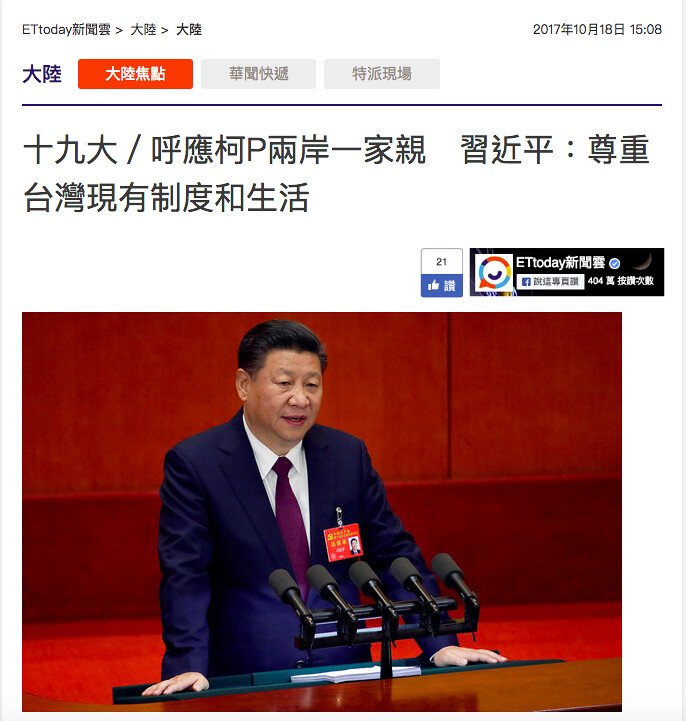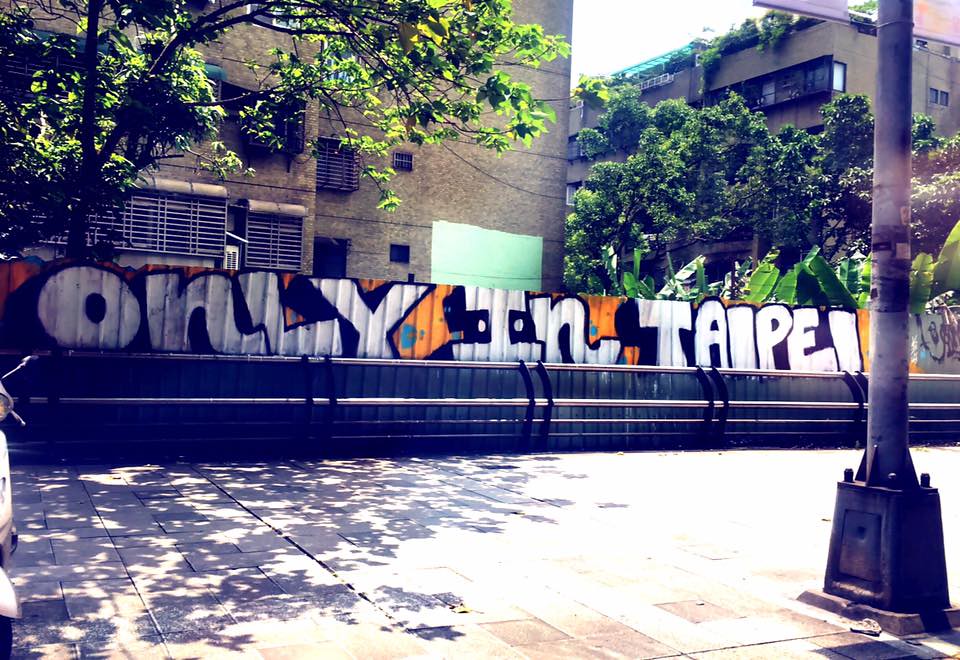 |
| from ETToday |
A piece by former Sunflower leader Lin Fei-fan came out today, warning of Ko's embrace of Xi Jinping's and China's oft-repeated phrase, "the two sides of the Strait are one family", essentially calling Ko's seeming doublespeak on China a strategy out of the Ma Ying-jeou playbook: insisting he's not pro-unification and then acting the opposite.
I'm already anticipating the criticism that'll flow in over such a prominent figure in Taiwanese Third Force politics essentially taking a shot at Ko as the Taipei mayoral election nears and no better pro-Taiwan candidates are running (or arguably, none who could actually win Taipei exist).
One thing in particular I expect to hear, which I'd like to dismantle right now, is the idea that Ko's and Xi's exact wording don't match: that Xi uses "兩岸一家人" (a translation of "one family" that implies a single household or very immediate relatives) and Ko uses "兩岸一家親" which implies a more distant familial relation, like cousins: the idea being that you can share ancestors or be related, but not be under the same household.
However, CRNTT/China Review News/台灣中評, essentially Chinese state-sponsored media in Taiwan and Hong Kong, published a lengthy article on the 19th Party Congress in 2017, in which the latter phrase - the one used by Ko - is explicitly quoted as being used by Xi:
“兩岸一家親”是習近平總書記積極宣導的兩岸關係和平發展新理念,這一新理念的內涵極為豐富。“兩岸一家親”的基礎是兩岸同屬一個民族和國家。“兩岸一家親”的對台政策意涵是用“一家人”的思維和邏輯,“將心比心”更加彈性地處理台灣問題、兩岸分歧和對台讓利。“兩岸一家親”理念要求兩岸同胞彼此信賴,彼此扶持,不斷擴大和密切兩岸交流交往,在融合發展中撫平歷史的傷痕,共同推進中華民族偉大復興的歷史進程。
My rough translation: "The two sides of the strait are one family" is a new concept for the peaceful development of cross-strait relations actively promoted by General Secretary Xi Jinping. This new concept is extremely rich in content. The basis of the phrase "two sides of the strait are one family" is that both sides of the strait belong to one nation. This policy towards Taiwan is to use "family" rhetoric and logic to "reconcile hearts" and deal more flexibly with the Taiwan issue, cross-strait differences, and benefit Taiwan. The "cross-strait family" concept requires compatriots on both sides of the strait to trust each other, support each other, continuously expand cross-strait exchanges, smooth the scars of history in the development of integration, and jointly advance the historic process of the great rejuvenation of the Chinese nation.
Barf.
Anyway, that's what Chinese media in Taiwan is saying. It's useful to get a sense of what the Chinese government thinks, and they are explicitly using the exact same phrase as Ko: not 一家人, but 一家親. Here's another source from ETToday and another from China Times (pan-blue/pro-China media in Taiwan) which contains extensive quotes from Xi. Here's an English translation of Xi's words in 2017. You have to dig, as this wasn't one of the top points of his address, but it's there.
Basically, it seems as though Xi used the old phrasing (一家人) up through about 2013, then switched to the newer one echoed by Ko after that (一家親), while occasionally switching back to the more 'immediate family' (一家人) translation. However, both retain the same translation in English.
I am sure that China does this sort of thing intentionally - taking words that have subtle, hard to parse translations in other languages and twisting them to suit their own ends. Because it's hard to explain these things in English, those who don't know Mandarin buy too easily into CCP-approved ways of thinking about these concepts. Another key example is the way they allow confusion to blossom over the concept of 華人 (Chinese, as in, something from Chinese culture) and 中國人 (from the nation called 'China'): essentially trying to control the debate about what it means to be 'Chinese' by equating it linguistically with anything 'Chinese' being 'a part of China'. Both words, however, translate as 'Chinese' and it's difficult to explain the difference unless you learn the language. It's also difficult for people who don't want to be lumped in under the CCP's idea of what it means to be 'Chinese' to use these words.
"一家親" in its "extended family (not necessarily of one household)" context might have been embraced by many Taiwanese, just as having Chinese cultural heritage (華人) might have been. Now, you can't say those things - you can't express an opinion that you are proud of your Chinese ancestry but don't want to be a part of China - without sounding like a unificationist. That suits some people very well indeed.
Note, in fact, that these points on the Chinese renderings of the phrase "two sides of the strait are one family" are not included in Lin's article: there's just too much you'd have to say to make it clear, and you'd lose readers' interest. It takes up valuable digital real estate - but the fact that it is so hard to discuss in other languages is exactly the point.
Some might ask whether Ko really means to echo Xi and China in his choice of words. I don't know - he's the kind of person who would stumble into this sort of thing unintentionally, having a tendency to...um, not think too much about how he comes across when he talks. He tends to stumble around answers to questions he really should see coming and have rehearsed, polished answers to, but apparently doesn't - not that I generally find Taiwanese politics very polished, mind you.
There's also the terrifying fact that Ko's milquetoast KMT opponent Ting Shou-chung uses the old, even more pro-unification "兩岸一家人" - a sign that Ting, not Ko, is the one in China's pocket? That both are useful idiots, blathering pro-China rhetoric that may sound different to Taiwanese voters but is seen in exactly the same way as China - and that this is intentional on China's part? That Ting is using the phrase in a bid to get the KMT back into the CCP's good graces - they miss their Daddy it seems - but the CCP has decided Ko is a better bet? I don't know.
But Lin puts forward a convincing case that we should at least keep our eye on Ko, and hold him accountable for his words: that CCTV seems to endorse him, and that China certainly is looking to co-opt Third Force and third-party politicians in Taiwan as it sees its inability to push its agenda forward through the KMT, and that his city-level exchanges with Shanghai are problematic. While he doesn't say so explicitly, the CCP's use of specific terminology is very deliberate. These exact phrases - like 兩岸一家人/一家親, or 中華民族偉大復興的歷史進程 ("the great rejuvenation of the Chinese nation") - are significant to them and are generally deployed using exactly the same language each time. They are signals, to some extent dog whistles to those they've co-opted. If Xi has changed his wording, Ko is using it too (and defending that use), the phrase seems to have been given prominence above the language of the so-called "1992 Consensus, and CCTV is happy about all of this, it could very well mean something.
This isn't to say that I think Ko is a unificationist. He strikes me as more of a too-smart-for-his-own-good catspaw or useful idiot. It wouldn't be the first time a seeming pan-green loyalist was manipulated into doing the CCP's bidding, but I don't know what motivates Ko. All I can do is point out that, when it comes down to the very specific terminology put out by the CCP, Ko's words do in fact match up.
I certainly don't think Taiwanese voters will embrace this "one family" doctrine either: when it comes to actual sentiments of most Taiwanese people, Ko's words are not as divisive as some may believe. Just because he's selling potentially problematic ideas doesn't mean the electorate is buying them.
Some will probably say Lin is trying to tank Ko's re-election. If you read between the lines of what Lin is saying, however, it's not that we should not elect Ko. I would bet CA$H money that he fully expects Ko to win, and that he's fully aware that Yao's a joke who doesn't stand a chance and Ting is far worse a choice than Ko. Ting's clearly anti-independence stance is a huge problem, and Yao's off partying like it's 1999, naming Chen Shui-bian (yes, that Chen Shui-bian) his "supreme advisor". LOL.
I'd bet a full case of wine that Lin's goal is to get the world to look more closely at Ko and hold him to account for his words, but not necessarily to refuse to vote for him. He's someone who pokes holes in establishment narratives and criticizes where criticism is due, regardless of the consequences. That's often (though perhaps not always) a good thing.
I am sure he doesn't believe that Taiwanese voters will suddenly go pro-China either: several times in the piece it points out that the KMT is not likely to regain its lost popularity, and that Ko's words on China do not echo the sentiments of the Taiwanese people. His concern is that the Taiwanese people are deliberately ignoring his words out of convenience, for lack of a better candidate, and that's a dangerous path to follow (see: Ma Ying-jeou).
I'm not sure this is the best way to make the case for Taiwan in English in international media, as it's really something for Taiwanese voters to think about and Taiwan gets limited screen time on any media outlet. The rest of the world is confused enough by China's consistently winning the rhetoric war on the China-Taiwan debate (though less so these days), and needs to hear a clear, clarion-bright call bringing the case for Taiwan: not muddy, difficult, unclear domestic political situations that Taiwan is trying to hash out itself. I'd like to see more 'clear cases for Taiwan' and less 'domestic Taiwanese politics' for global readers.
But that doesn't mean Lin is wrong.
And every time the 1992 Consensus is called out for the pro-China garbage it is in English-language media, the better. I am only sad that the word "fabrication" was not used, because that's what it is. More of that, please.


